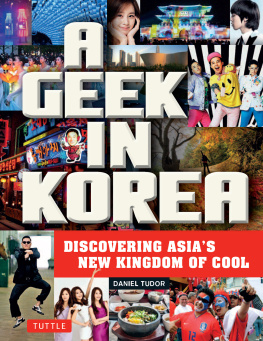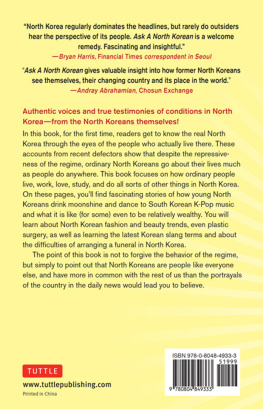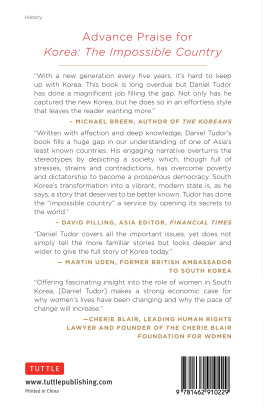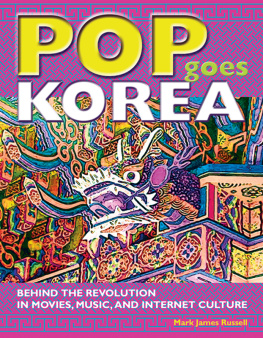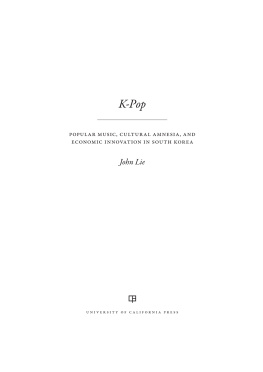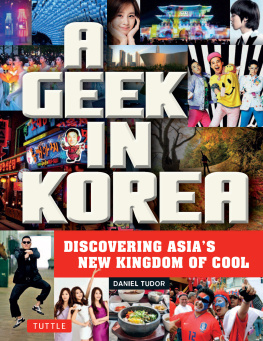
Contents
Published by Tuttle Publishing, an imprint of Periplus Editions (HK) Ltd.
www.tuttlepublishing.com
Text copyright 2014 Daniel Tudor
Maps 2014 Periplus Editions (HK) Ltd
All rights reserved. No part of this publication may be reproduced or utilized in any form or by any means, electronic or mechanical, including photocopying, recording, or by any information storage and retrieval system, without prior written permission from the publisher.
ISBN: 978-0-8048-4384-3
ISBN: 978-1-4629-1407-4 (ebook)
Distributed by:
North America, Latin America & Europe
Tuttle Publishing
364 Innovation Drive
North Clarendon
VT 05759-9436 U.S.A.
Tel: 1 (802) 773-8930
Fax: 1 (802) 773-6993
www.tuttlepublishing.com
Japan
Tuttle Publishing
Yaekari Building, 3rd Floor
5-4-12 Osaki, Shinagawa-ku
Tokyo 141-0032
Tel: (81) 3 5437-0171
Fax: (81) 3 5437-0755
www.tuttle.co.jp
Asia Pacific
Berkeley Books Pte. Ltd.
61 Tai Seng Avenue #02-12
Singapore 534167
Tel: (65) 6280-1330
Fax: (65) 6280-6290
www.periplus.com
18 17 16 15 14
7 6 5 4 3 2 1
Printed in Singapore
1408CP
TUTTLE PUBLISHING is a registered trademark of Tuttle Publishing, a division of Periplus Editions (HK) Ltd.

PHOTO CREDITS
Note: Page numbers correspond to the print edition.
Adam Lai (Flickr: laikt8/6072323604/in/set-72157627416341412) top right
Commons Wikimedia files: Abasaan (Apgujeong_01.JPG) mid, 2nd photo
en.wikipedia files: left bottom, 2nd photo
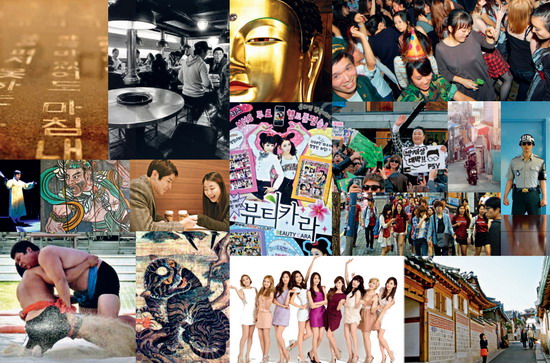



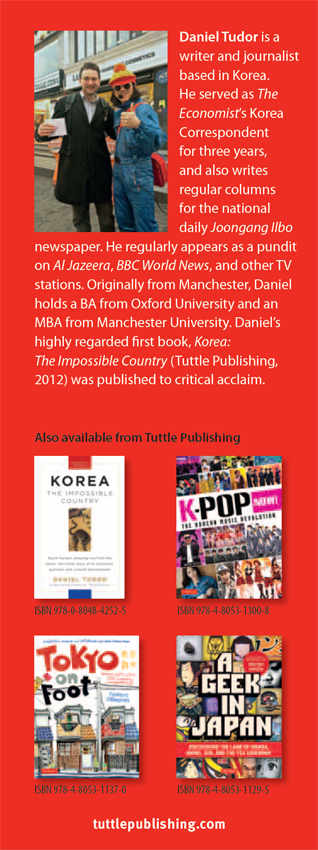
THE RISE OF COOL KOREA
Korea? But theres a war going on there, isnt there?
Korea? Do you mean the North, or the South?
These were the kind of reactions I got when I first told people I was going to live in Korea. They knew about the Korean War; they knew about the dictator in Pyongyang so memorably rendered in Team America: World Police ; and, they also knew that dog-eating was a common practice; Remember, Danny: a dog is for life, not just Christmas dinner, wrote one old friend in a card sent to me for the 2004 holiday season.
But something has changed. In the past decade or so, Koreaand by Korea, I am referring to the Southhas become cool. Though still off the radar for many Westerners, inbound tourist numbers have rocketed; creative exports like computer games, pop music, movies, and even the odd novel, have gained international attention in a way that no one here would have dared imagine at the turn of the millennium.
Around Asia, Korean idol stars are greeted with Beatlemania-style levels of hysteria. Actors like Bae Yong-joon are worshipped by legions of Japanese housewives. And a critical blog post about a top Korean pop groups latest single will draw from overseas fans the kind of wrath that I would reserve for someone who had just gravely insulted my mother.


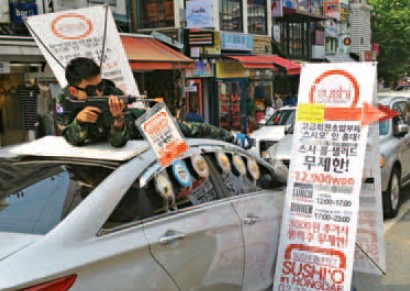

The new face of Korea? There are few people in the world who dont recognize Psy, of Gangnam Style fame. His charmingly silly image has provided a great counterpoint to traditional conceptions of Korea, which center on the Korean War and industrial development.
In the days of its rapid development, Korea inevitably had a rather gray, industrial image. Celebrities are now adding color, but this is only half the story. Today, a student toting a heavy bag full of textbooks might also have a guitar slung over his shoulder. Particularly around the Hongik University area of Seoul, there has been a flowering of indie culture. The bars and cafes there are full of people whose dreams are of rock n roll, rather than of working for Samsung. They are driving cool Korea just as much as any actor with fancy hair.
But even if the Korean hipster isnt sure about becoming Samsung Man, theres still a good chance Samsung will have made the phone in his pocket. Korean firms are now overtaking Japanese rivals and dominating markets worldwide in all types of funky gadgets. Hyundai cars used to be something of a joke in the US, but now they win awards. And in defiance of the risk aversion of their parents generation, a new breed of high-tech start-up entrepreneur is emerging.
But why is all this happening? Is it just a matter of coincidence that Koreans suddenly seem to be making internationally successful music and movies, as well as the mp3 players and flat-screen TVs on which we appreciate them? Is it the result of a new focus on style and quality now the develop-at-all-costs philosophy of the past half century is finally subsiding? Is it the result of the political democratization of the past 25 years? Or is it, as cultural commentator and TV presenter Park Jung-sook says, simply Koreas turn to shine?
My cop-out answer is all of the above. But it is a pleasure to watch it all unfold, and a privilege to be able to write about it. I will consider this book a job well done if I can convince you to come here and see it all for yourself. So, I hope to see you in Seoul!


Falling in Love with a Country
There are many reasons why people come to this country. Some come for work, others come for marriage, and there are even those who are so obsessed with a particular Korean TV star or pop group that they pack up their things and move to Seoul. These days, there are also a few who have noticed cool Korea and want to get in on it. But for me, it all started with a sporting event.

I first set foot in Korea on the day the national football team played Italy in the 2002 World Cup. Wed been on the move for well over fifteen hours, in a journey that took in two plane rides and a bumpy trek in a car up the coast from Busan to the industrial city of Ulsan. Shattered, we stood at the check-in desk, waiting for service. The staff had no interest in helping us. They were watching TV: the match had gone to extra time, and it was made clear that everything had to wait until that deciding golden goal sailed beyond the outstretched hands of an agonized goalkeeper. When it didcourtesy of Koreas famed pretty-boy striker Ahn Jung-hwanthe joy that erupted was of the like of which I had never seen before. In the lobby of our five-star hotel, people dressed in red t-shirts, red bandanas, and with red face paint on, were bouncing in every direction. (continued on next page)
Next page
